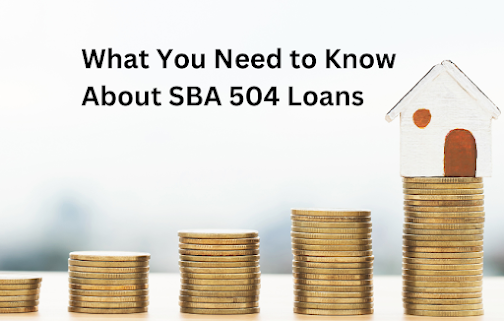What You Need to Know About SBA 504 Loans
Small enterprises are the backbone of any economy and need adequate financing to grow and expand. Unfortunately, traditional bank small business loans often charge high-interest rates and stringent terms, making it challenging for them to access the financing they need. This is where the SBA 504 loan program comes in.
Let's understand how it works.
Three Parties Involved in SBA 504 Loans
Three parties are involved in the SBA 504 loan process: the borrower, an SBA-approved lender, and a Certified Development Company (CDC).
The first party involved in the SBA 504 loan process is the borrower. This is the small business owner seeking financing to purchase fixed assets such as real estate, equipment, or machinery. The borrower is responsible for providing 10% of the loan amount as a down payment and securing the remaining 90% through the SBA 504 loan program.
The SBA-approved lender is the second party involved in the SBA 504 loan process. The lender is responsible for providing 40% of the loan amount and is usually a traditional bank or financial institution. The lender is responsible for underwriting the loan and ensuring the borrower meets the necessary creditworthiness requirements.
The third party involved in the SBA 504 loan process is the Certified Development Company (CDC). The CDC is a non-profit organization that the SBA approves to finance small businesses. The CDC is responsible for providing 50% of the loan amount and working with the borrower to ensure that the project meets the SBA 504 loan program's requirements.
The CDC plays a vital role in the SBA 504 loan process by financing small businesses that may not have access to traditional financing options. In addition to providing financing, the CDC provides counseling and technical assistance to help small businesses succeed.
One of the benefits of working with a CDC is that they have a deep understanding of the local market and can provide guidance on real estate values, market trends, and other essential factors that can impact the success of a small business. The CDC can also help small businesses navigate the complex SBA 504 loan process and ensure all necessary documentation is completed and submitted correctly.
Eligibility Requirements for SBA 504 Loans
To be eligible for an SBA 504 loan, a business must be a for-profit organization that meets current SBA size standards.
A business must meet specific criteria to qualify for an SBA 504 loan. Firstly, the business must be a for-profit organization that meets the current SBA size standards. The size standards vary by industry based on the number of employees or the business's annual revenue. The SBA size standards ensure that the program benefits small businesses, not large corporations.
Secondly, the business's net worth cannot exceed $15 million, and it must earn an average of $5 million or less per year. The SBA imposes these limits to ensure that the program benefits small businesses, not more giant corporations that may have access to other financing options.
Thirdly, the loan must be used for projects that will create a specific number of jobs per the amount of money loaned or must meet some community development or public policy goal. This means that the business must demonstrate that the project will positively impact the local economy by creating jobs or contributing to the community's development.
In addition to these eligibility criteria, the SBA 504 loan program has specific requirements for the use of loan proceeds. The loan cannot be used for working capital or to refinance existing debt.
To apply for an SBA 504 loan, a business must work with an SBA-approved lender and a Certified Development Company (CDC). The lender is responsible for providing 40% of the loan amount, the CDC offers 50%, and the remaining 10% comes from the borrower.
Terms of SBA 504 Loans
The SBA 504 Loan Program offers up to $5 million (or $5.5 million for manufacturers) with 10 to 20 years loan terms. Rates are fixed at Prime + 1.25% - 2.75%, and the loan to value (LTV) is up to 90%. The minimum debt service coverage ratio (DSCR) is 1.20x on existing cash flow, and the loan uses the project assets being financed as collateral, with personal guarantees from the principal owners. Fees may apply.
Benefits of SBA 504 Loans
The SBA 504 loan program offers many advantages to businesses, including -
Long-Term, Fixed-Rate Financing
Companies can secure a loan at a fixed interest rate, which can be beneficial in several ways. It has a predictable payment schedule for better budgeting and financial planning and prevents businesses from fluctuations in interest rates impacting their loan payments.
Lower Interest Rates
The interest rates on SBA 504 loans are typically lower than many other financing options available to small businesses. This is because the Small Business Administration guarantees small business loans, reducing lenders' risk. As a result, lenders can offer borrowers lower interest rates, saving businesses money over the life of the loan.
Lower Down Payment Requirements
Compared to other SBA loan programs, such as SBA 7(a) loans and express loans, the SBA 504 loan program has lower down payment requirements. With the SBA 504 loan program, businesses can finance up to 90% of the fixed asset's purchase price or appraised value, with only a 10% down payment required. This lower down payment requirement allows businesses to preserve their cash flow and invest in other business areas.
Job Creation Requirements
The SBA 504 loan program has specific job creation requirements, which can benefit the business and the local community. The loan must be used for projects that will create a particular number of jobs per the money loaned. It must meet some community development goal or public policy goal while complying with the job average requirements of CDCs. This can help businesses grow and expand while stimulating economic development in the surrounding area.
Improved Access to Capital
For many small businesses, accessing capital can be a challenge. The SBA 504 loan program can help bridge this gap by providing businesses access to affordable, long-term financing. Since the Small Business Administration guarantees small business loans, lenders may be more inclined to work with companies that may not meet traditional lending criteria. This can help businesses secure the financing they need to grow and thrive.
Conclusion
In conclusion, the SBA 504 loan program can be an excellent financing option for small businesses that need to purchase fixed assets, such as real estate or equipment. Additionally, the program's job creation requirements can help stimulate economic development in the surrounding community.
Business owners need to understand the eligibility requirements and terms of the loan before applying. By doing so, they can decide whether an SBA 504 loan suits their needs.
If you're considering an SBA 504 loan, 504 Capital is here to help. Our Certified Development team of professionals in the VA, MD, and NC areas is committed to supporting small business owners in their growth and evolution. Contact us today at 757-623-2691 or online to discover new opportunities for your business's future.
FAQ’s
What are the eligibility requirements for SBA 504 loans?
To be eligible for an SBA 504 loan, a business must be a for-profit organization that meets current SBA size standards, have a net worth of less than $15 million, and earn an average of $5 million or less per year. The loan must also be used for projects that will create jobs or contribute to community development.
How do SBA 504 loans differ from other SBA loan programs?
SBA 504 loans differ from other SBA loan programs, such as SBA 7(a) loans and express loans, in that they have lower down payment requirements, longer loan terms, and are specifically designed for financing fixed assets.
How can I apply for an SBA 504 loan?
To apply for an SBA 504 loan, a business must work with an SBA-approved lender and a Certified Development Company (CDC). The lender is responsible for providing 40% of the loan amount, the CDC offers 50%, and the remaining 10% comes from the borrower.



Comments
Post a Comment